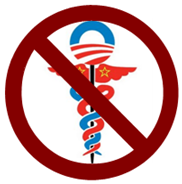
That’s because the new federal health care law includes provisions that discourage companies from growing their operations to the point where they have over 49 employees. Once smaller firms hit the 50 employee mark, the health care mandate and all of its enforcement provisions are activated. The penalty is $2,000 for each full-time employee or an equivalent part-time employee. For larger companies, the most sensible calculus is to continue providing insurance for the time being. But they do have an added complication. Firms with 50 or more employees, that continue to offer health care coverage, will have to pay out $3,000 for each worker who declines coverage from the employer and instead gets it subsidized from the health insurance exchange. What this means in pratice, is that small, and even medium sized businesses that could grow and expand in 2013 will instead stay their hand. In fact, this is already happening.
The Patient Protection and Affordable Care Act (PPACA), widely known as Obamacare, has forced some business owners to swap part-time positions for full-time positions. In Cedar Falls, Iowa, private companies have announced that will curtail worker hours so they do not have to absorb the added cost of health insurance. From here it gets worse. City officials are cutting back on hours that already technically part-time. This action comes in direct response to the PPACA’s requirement that employers provide insurance anyone who works at least 30 hours a week.
The restaurant industry, which has an abundance is particularly vulnerable to Obamacare. Just ask Randy Price, president of the Rocky Mountain Restaurant Group. It is not financially feasible for him to provide health insurance to all of his employees. Given the high turnover rate that is typical of the industry, the administrative costs alone would be prohibitive, he has explained in media interviews. Beginning in 2014, he would have to offer insurance to any employee that works at least 30 years. For this reason, he likely to reduce the number of workers available for employees who are already considered part-time.
The problem is not limited to small business. Dana Holdings Corp. which has about 25,000 employees worldwide, has made it clear that layoffs are very possible, if not probable, once Obamacare is fully implemented. Company officials have also said they will look to cut other costs before they cut jobs.
Obamacare proponents claim that the federal health care law actually helps small business since it offers a tax credit. But in reality they are quite limited in scope. The credit only covers employers who have up to 25 employees and they only last for a maximum of six years. In fact, only 12 percent of small business in America will benefit from the tax credit, according to an analysis of the Congressional Budget Office (CBO). If anything, Obamacare will likely stifle job growth and business expansion.
Going forward, Obamacare will make it more difficult for small-businesses, which are responsible for creating most new jobs, from turning a profit. They will need to absorb added paperwork, new mandates, new regulations and higher payroll taxes.
President Obama has repeatedly promised that that those Americans who like the current health care arrangement they have through their employer will be permitted to keep this coverage. But he is assuming that what makes sense to him, and other centralized planners in Washington D.C., also makes sense to employers in the private sector. If it costs employers more to provide health care coverage than it does to pay the $2,000 penalty, they will likely pay the penalty. Furthermore, the tax breaks that are now extended to low and middle-class workers for their employer sponsored plan will probably be outpaced by the subsidies they receive on the exchange system.
There’s a fair amount of iron here in that young adults who voted for President Obama in such overwhelming numbers will put at a severe disadvantage. Not only will they be coerced into buying health insurance at a time when they are paying down student loans, but they will also need to foot the bill for the parents and grandparents, to say nothing of additional entitlement costs.
It all becomes very complicated in a few weeks as America’s long-standing constitutional principles recede into history.
Kevin Mooney is a contributing editor to Americans for Limited Government. You can follow Kevin on Twitter at @KevinMooneyDC.






